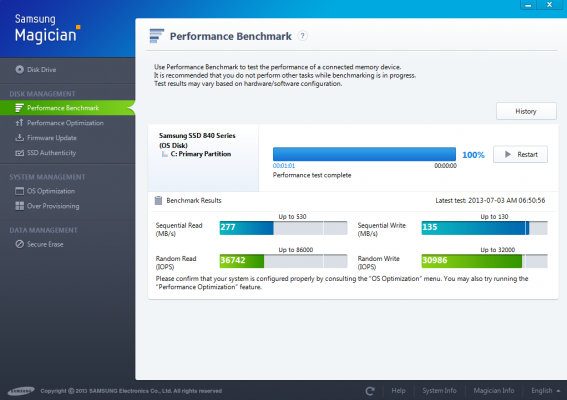@cranky, @Crazy_Eddy
Is it advisable to use CCleaner on an SSD?
Views on the web are mixed on this aspect.
Is it advisable to use CCleaner on an SSD?
Views on the web are mixed on this aspect.
Last edited by a moderator:
Whatever I have read & understood till now based on that the answer is NO, best is to stop some of the C drive functions such as indexing & page file & move the temp folder & My documents folder to another physical drive. That will save the ssd from degrading over time.@cranky, @Crazy_Eddy
Is it advisable to use CCleaner on an SSD?
Views on the web are mixed on this aspect.
I actually don't see the point of this. An SSD is supposed to boost performance. It may affect lifespan, but why buy an SSD if you're going to shift everything off disk? In my case with everything as is, I've still had only 2TB of writes after a year.best is to stop some of the C drive functions such as indexing & page file & move the temp folder & My documents folder to another physical drive. That will save the ssd from degrading over time.
Oh CCleaner to just delete temp files is ok. Edit: Unless you're using the secure delete option - that is pointless on an SSD. Even my 64GB SSD has about half the capacity free, so I've left my pagefile on it.
I use CrystalDiskInfo to monitor my drives. It has a 'Total Host Writes' indicator.
CCleaner is absolutely fine on SSDs FWIW.
Do ensure TRIM is working though, the SSD can handle the additional write cycles as Windows does not physically overwrite anything except the allocation tables. Do *not* choose the 'wipe free space' option. Hibernate option is turned off and the file is deleted, but yes, pagefile stays and stays on SSD since that was kind of the whole reason to upgrade.
I do move as much stuff off the disk as possible except when there is only one disk in the system (2 of my 4 machines are like that). The main offender is actually the Mozilla/IE cache, moving those off disk reduces about 25-30MB of writes per day if you really are picky. I'm usually not.
CrystalDiskInfo is probably right, since I get matching values in Samsung's SSD Magician tool. I'm not sure which SMART parameter they're referencing. A more useful parameter would be the 'wear levelling count', since that will tell you how many of the drive's rated P/E cycles you have used.I use HD Sentinel and that too showed the total number of writes undergone but there's a mismatch between what Sentinel and CrystalDiskInfo say; the former says 24GB while the latter displays 34GB for my day old SSD.
What kind of stuff (apps) you move to the hard drive? Does that stuff (app) go because of installation size or the unnecessary read/write cycles they cause?
I am making a list of programs which I use the most & they do read write operation & one of them is portable firefox, will it be advisable to use installable firefox on C drive or move the portable firefox to another drive?
Portable programs do lot of temporary read/ write then delete it when I close them.
IOW, I'd either stick with the older Samsung 830 (using MLC); or move to the 840 Pro (also using MLC); and avoid the standard 840 (non Pro) model in the Samsung lineup using lower endurance TLC memory cells, especially if going to a smaller 120GB model, as the performance difference is much greater (in favor of the 830) in the new drives when looking a write speeds for the smaller drive models (830 Series 128GB versus 840 120GB).
The 840 Pro would be a good bet though (it doesn't have the endurance and speed problems you find with the new 840 series standard model).
Basically, the new 840 Pro excels in virtually all areas. But, the new 840 standard series drives have much lower endurance (as well as lower performance when you look at the smaller 120GB drive size when compared to the older Samsung 830 series 128GB drives).
So, personally, I'd avoid the new 840 drives, unless going to an 840 Pro model.
Frankly I am still thinking that if I have to spend 9K then 2Tb wd back hdd 7200 rpm are the choice which I should consider or think of 1TB fast 10000rpm drives.Obviously the 840 Pro. You should've said your budget was 9k from the beginning

SSD Myth #1 : Buy a slow SSD because I don't have a SATA III portFinally ordered the samsung 840 120gb as I found that my old hardware will not be able to make use of speed of the 840 Pro version.
With this older system, this ssd itself running in AHCI SATA2 (3Gb/s) is giving me half the transfer speed of this ssd is capable of
 when you said you were considering a WD black instead.
when you said you were considering a WD black instead.
